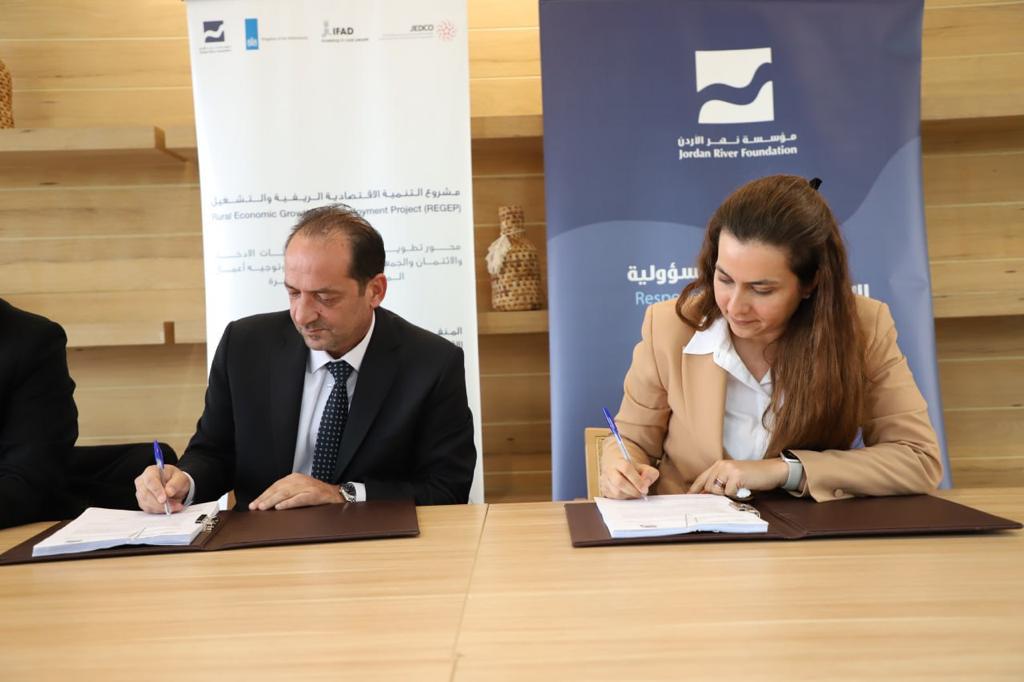- Local News
- Tue-2023-11-21 | 04:11 pm

Nayrouz News Agency : The Jordan River Foundation (JRF) has entered into a collaborative partnership with the Jordanian Enterprise Development Corporation (JEDCO) under the auspices of the Rural Economic Growth and Employment Project (REGEP).
The primary objective of this partnership is to oversee the effective implementation of grants directed towards the beneficiaries of the initiative, which is designed to address the challenges posed by water scarcity.
As outlined in the statement released by the Jordan River Foundation on Tuesday, the REGEP initiative aims to bolster the capacities of beneficiaries, including savings groups and field schools. This will be achieved through specialized technical training along with the provision of 144 financial grants.
The grants are intended to support the establishment of hydroponic agriculture and water harvesting projects, with the overarching goal of generating employment opportunities in rural areas spanning the governorates of Irbid, Mafraq, Jerash, Ajloun, Zarqa, Madaba, Balqa, Karak, Tafila, and Ma’an.
Given the prevailing chronic water shortage in Jordan, particularly in rural communities, the project assumes significant economic importance. Many of these communities face financial constraints hindering their ability to support innovative agricultural ventures, especially among women and youth.
JEDCO, an organization actively involved in diverse development programs across manufacturing, services, and agriculture sectors, will spearhead the implementation of the project. Its role extends to providing essential support to economic initiatives, with a focus on fostering growth, development, and enhancing competitiveness.
Concurrently, the Jordan River Foundation is committed to sustaining productive projects to elevate its commercial presence in the hydroponic agriculture and water harvesting sectors. This becomes especially pertinent in light of the economic challenges confronting farmers in rural areas.
The foundation adheres to a clear and comprehensive methodology that takes into account the demographic nature of the population. It strategically leverages the comparative advantages of different regions and actively engages in networking across various sectors to maximize impact.
The primary objective of this partnership is to oversee the effective implementation of grants directed towards the beneficiaries of the initiative, which is designed to address the challenges posed by water scarcity.
As outlined in the statement released by the Jordan River Foundation on Tuesday, the REGEP initiative aims to bolster the capacities of beneficiaries, including savings groups and field schools. This will be achieved through specialized technical training along with the provision of 144 financial grants.
The grants are intended to support the establishment of hydroponic agriculture and water harvesting projects, with the overarching goal of generating employment opportunities in rural areas spanning the governorates of Irbid, Mafraq, Jerash, Ajloun, Zarqa, Madaba, Balqa, Karak, Tafila, and Ma’an.
Given the prevailing chronic water shortage in Jordan, particularly in rural communities, the project assumes significant economic importance. Many of these communities face financial constraints hindering their ability to support innovative agricultural ventures, especially among women and youth.
JEDCO, an organization actively involved in diverse development programs across manufacturing, services, and agriculture sectors, will spearhead the implementation of the project. Its role extends to providing essential support to economic initiatives, with a focus on fostering growth, development, and enhancing competitiveness.
Concurrently, the Jordan River Foundation is committed to sustaining productive projects to elevate its commercial presence in the hydroponic agriculture and water harvesting sectors. This becomes especially pertinent in light of the economic challenges confronting farmers in rural areas.
The foundation adheres to a clear and comprehensive methodology that takes into account the demographic nature of the population. It strategically leverages the comparative advantages of different regions and actively engages in networking across various sectors to maximize impact.










